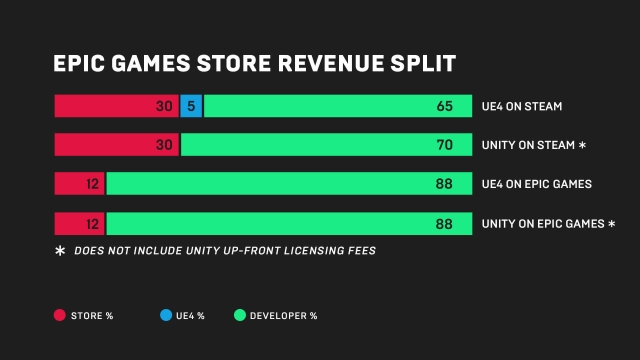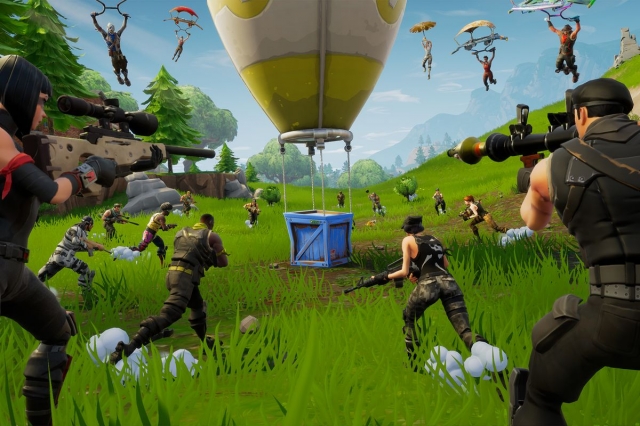
Does the Epic Games Store Pressure Valve Back Into Game Development?
Valve isn't a game developer anymore; well, at least they don't want to be. Can you blame them? When your total equity is reported to be over $2.5 billion dollars, and the majority of your revenue is coming from your digital storefront Steam, which raked in $1.5 billion in 2014, you'd probably ask yourself: why bother making games?
Up until five days ago, there wasn't.

On 4th December, Epic Games announced the release of their new storefront, simply titled the Epic Games Store. Epic's new marketplace, which launched days later during the Game Awards 2018, operates in a similar fashion to Steam. What is enticing for developers is a much more favorable revenue share than what Valve offers. Steam's revenue sharing is set up to function in a tiered system, with the distributor taking a 30% revenue cut on games generating under $10 million in sales, 25% on games generating between $10 and $50 million, and 20% for sales over $50 million. Obviously, this favors large, AAA publishers, who have large-scale marketing and advertising budgets to propel sales, comparative to small, independent developers; but this is where Epic Games steps in. The developer, and new distributor, is offering a 12% revenue cut across the board for all developers and publishers, whether they are using the company's Unreal engine or not.
Is Steam too big to fail at this point for Valve? I feel pretty safe saying yes, barring something catastrophic; but that doesn't mean that they can't lose ground. Until last week, no one was truly in a position to contest with Valve in terms of a distribution storefront. Sure, you have Origin with EA and Uplay with Ubisoft, but you can purchase the majority of the games offered on their respective storefronts on Steam as well. There is no exclusivity with the third party platforms, and that's understandable. EA and Ubisoft would be leaving far too much revenue on the table doing that.
You know what all three of the previously mentioned distributors don't have? The most lucrative gaming entity currently on the market: Fortnite.

Epic Games is already taking a page from Valve's original Steam playbook, by requiring users to have an Epic Games account to play their games. More importantly though, they require users to have the Epic Games Launcher (and now Store) installed to play Fortnite on PC. This is the same formula Valve used when they released the critically acclaimed Half-Life 2 in 2004, by requiring users to sign up for a Steam account and have the digital storefront’s client installed on their PC. Being one of the most anticipated titles in gaming history at the time helps your cause quite a bit, but to an extent, there's an argument to be made in terms of popularity surrounding each respective series. By no means I am saying the battle royale staple is a 'better' game than Half-Life 2, but compared to its 12 million plus sales and Fortnite's 200 million free-to-play player count, the basis for a popularity argument could be made.
But I'm sure you're asking, 'what does this have to do with Valve making games?'. A lot, actually; and it’s a situation in which Gabe Newell and staff hold all the cards in. Epic Games is the first gaming entity since Valve with Half-Life to have an exclusive title that has phenomenon-level popularity in the PC gaming market. With the now updated Epic Games Launcher including the Store, the North Carolina developer's install base is astronomical. You know what is astronomical to the majority of developers who normally rely on distributing their games on Steam? 18% of the revenue their game makes. With Steam just implementing their new revenue sharing plan, it's quite unlikely the company will completely change said plan in the matter of days, and nor should they right away. Steam is still the go-to place for PC gaming. Just from their dominance of the market for decades, they have become all but a household name for gamers on all platforms. What about in a year though? What if their revenue is down 10% next year? That's $150 million dollars. That's quite doubtful to happen, but who knows? This is unchartered territory for Valve, and the first time they've truly had a potential competitor. How does Valve possibly make up for any lost revenue and market share, in general?
That's simple. Do what they did to start their dominance of the PC market: develop games. No, I'm not talking digital card games (no offense to Artifact fans. I feel they could even agree with this); I'm talking full length, creative experiences, that helped cemented their place with gaming's greats. Fans have been salivating over the thought of new entries for series such as Portal, Left 4 Dead and Team Fortress, and would gladly pay to see it happen. This is a company that would never have to do any kind of marketing campaigns whatsoever. Valve could tweet just the number '3' and it would be the most engaged tweet in the history of the social media platform. While it is encouraging to see the acquisition of studios like Campo Santo (developer of Firewatch and the upcoming In The Valley of Gods), it's a far cry from the truly hand-crafted experiences Valve previously developed in-house.

Who knows, the Epic Games Store may not take off. If you ask me though, one of the biggest stories to come out of the Game Awards 2018 was the lack of 'coming to Steam' advertisements, and the plethora of 'coming to the Epic Games Store' branding in its place. This also isn’t for titles exclusively shown at last Thursday’s show, either. Satisfactory, a first-person open world factory builder from Coffee Stain Studios, has scrapped their Steam launch in lieu of Epic Games new online marketplace.
The Epic Games Store is great for the PC gaming industry, because it creates competition in a market that hasn't seen much of it for almost 15 years. Competition is healthy. When push comes to shove, it can bring out the best in a company. Now the questions is: what is Valve's answer to the Epic Games Store? Only time will tell.








COMMENTS